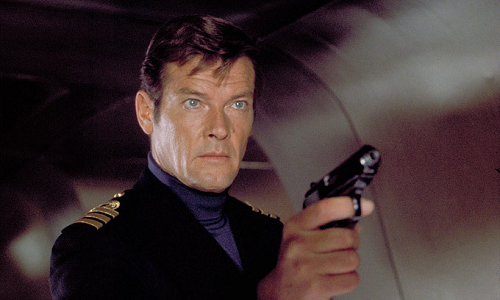 The Spy Who Loved Me
The Spy Who Loved Me
Directed by Lewis Gilbert
Screenplay by Christopher Wood and Richard Maibaum
UK, 1977
There’s an undeniable lasting appeal to Bond. Lasting 50 years is certainly proof of that, but there’s something deeper. After all, one can point to Star Trek and Doctor Who as cultural icons that have stood the test of time, but there’s something different about Bond. Trekkies or Whovians faced ostracization for many years, the fans relegated to dark corners and hushed tones of conversation. Ordering a vodka martini, shaken not stirred, however, paints someone as the very opposite of a nerd, something that has never changed throughout the run of Bond. So what stands Bond apart? It can’t be the saving the world aspect of things; after all, there are many heroes and heroines who’ve saved the world on a regular basis, perhaps with more frequency than Bond, considering the latter’s exploits only have 23 films dedicated to them, far less than the number of episodes devoted to other heroes (to go through all the stories of Superman’s exploits in world-saving would take considerably longer, just as an example). What made Bond unique, however, was that he always did it in style. Bond could always be counted on for a witty quip following escape from a harrowing situation, to never lose his cool no matter how outmatched he may seem, to never be more than a tie adjustment away from wiping away all traces of just having saved the world at considerable risk of losing his life.
It was this aspect of Bond that Roger Moore personified best; as the follow-up to Connery following Lazenby’s short stint in the role, Moore definitely faced a challenge in having to make the character his own while effectively stepping out from the long shadow that Connery’s portrayal had cast. And smartly, rather than continue down the ruthless killer path that Connery had infused the role with, Moore chose to focus on the charm that the character brought to the table. This was an important decision, because while Bond’s ruthlessness proved why he was such a good Double-O agent, his charm proved why he was such an effective spy, and Moore was a large reason why suaveness is such an essential part of Bond’s persona. This is very evident in The Spy Who Loved Me.
One of the best things about this movie is the character of Agent XXX, also known as Major Anya Amasova. Numerous Bond movies have found the MI-6 agent in an unequal power balance with the leading female, either by virtue of being in a position where he could save her from a henchman in whose clutches she has found herself for years, or simply by being a government agent, and thus privy to more information than the female, who’s working alone, could possibly amass. Amasova, however, presents an interesting new spin on the role as someone who’s equal to Bond in nearly every way, even up to being aware of the specifics of Bond’s spy car. It’s not inconceivable that, in some alternate universe, Bond would be the supporting player in a movie franchise revolving around Amasova, which is a rarity and certainly puts her in the upper echelon of people who have fought alongside Bond. Amasova even manages to deliver a few quips of her own along the way, responding to Bond’s gratitude at saving his life with “We all make mistakes, Mr. Bond.”
The teamwork aspect of this mission is also a major strength of the movie. Despite his seemingly superhuman heroics, some of Bond’s best victories have been the ones where he has proven his skill at being a key member of a group of individuals fighting the evil force, and this movie is no exception. The climactic fight, which sees British, American, and Soviet submarine crews join forces, manages to ratchet up the tension very effectively by throwing Bond in the midst of the fight, clearly a force, but not one that’s alone. Having many people fighting against each other, while preventing a strain on the suspension of disbelief, also raises the stakes by practically removing any certainty about who lives and who dies. Good people can get hit, and evil henchmen can run away, just like in a real battle. In addition, working with a team also gives Bond additional resources in defeating his foes, allowing for a better display of his ability to come up with an effective plan without excessively crossing over into absurdity.
Of course, no discussion of a Bond movie would be complete without touching on the villains. The introduction of lead villain Karl Stromberg, played by Curt Jurgens, paints him as ruthlessly power-hungry yet calculative very effectively by drawing out the demise of the Doctor and the Professor following the quick death of the double agent. But the real highlight is his henchman Jaws, played by Richard Kiel, who at the time bears more than a passing resemblance to Michael Shannon. Jaws’ metal teeth and lack of dialogue add an effective air of menace that’s accentuated by his large frame, making his seeming invincibility very believable. A man named Jaws taking a fatal bit out of a shark was also an interesting reversal, and the combination of factors makes Jaws a worthy addition to the gallery of notable Bond foes, perhaps even ahead of his boss.
Overall, this film is a fun addition to the Bond canon, and one that proves what made Roger Moore such an effective fit in the role. Barbara Bach’s Major Amasova and Richard Kiel’s Jaws both leave their mark on the franchise in all the right ways, and the action sequences, starting with a ski chase through snow-capped mountains, continuing with an extended car chase as well as the climactic fight for control of the Liparus ship that serves as the control station for the submarines, manage to stay thrilling throughout the film’s duration. This is a definite must-see for Bond fans, as it’s got everything one could want from a 007 film, and more. While many have tried to replicate the success of James Bond, as Carly Simon sings over the opening credits, nobody does it better, and The Spy Who Loved Me is solid proof of that.
– Deepayan Sengupta
This article is part of our 007 marathon. You can find all the entries by clicking here.







